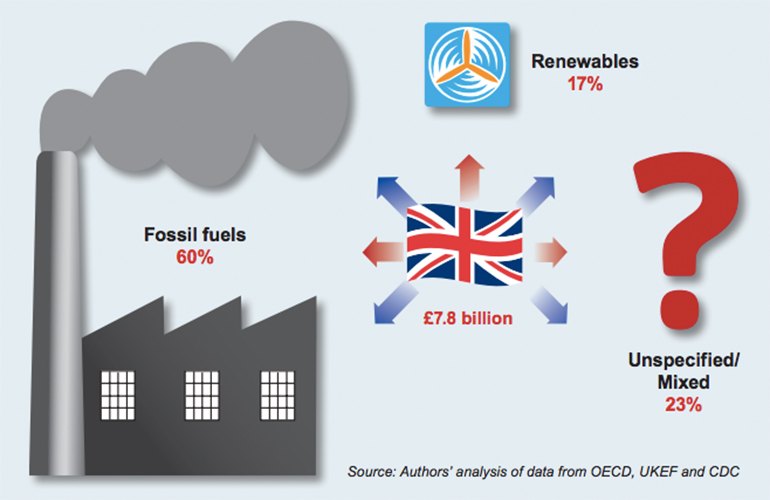During the period 2010-2017, the UK government provided financial support for energy in developing countries worth £7.8 billion (≈ EUR 8.7 billion). Of that 60 percent – or £4.6 billion (≈ EUR 5.1 billion) – went to fossil fuels despite the commitments the UK has made internationally to tackle climate change a new report by the Catholic Agency for Overseas Development (CAFOD) in collaboration with the Overseas Development Institute (ODI) has found.

The UK government provided support for energy in developing countries with a total value of GBP 7.8 billion (≈ EUR 8.7 billion) from 2010 to 2017. Of that 60 percent – or GBP 4.6 billion (≈ EUR 5.1 billion) – went to fossil fuels, which are a major contributor to climate change.
Some of the financial support was in the form of export guarantees, credit and insurance for British businesses operating overseas in the fossil fuel industry. However, over GBP 600 million (≈ EUR 667.3 million) of aid money was spent on fossil fuels, even though aid money is supposed to help people living in poverty – who are being hit hardest by climate change.
The report “UK support for energy 2010–2017: Protecting the climate and lifting people out of poverty?“, the third of its kind undertaken by CAFOD together with the Overseas Development Institute (ODI), found there is still a contradiction between the commitments the UK has made internationally to tackle climate change and the support it gives to fossil fuels.
In fact, it appears there was no change in the UK’s strategy on overseas energy after it signed up to both the Paris Agreement and the Sustainable Development Goals (SDGs) in 2015, both of which pledge to tackle climate change.
The UK wants to be a leader on climate change, so it’s shocking that UK aid money is still being spent on fossil fuels overseas. At a time when we are reducing the UK’s own reliance on fossil fuels, why are we spending billions of pounds saddling poorer nations with outdated technologies that will cause more climate damage? said Dr Sarah Wykes, CAFOD Lead Climate Analyst.
CAFOD calls on the Secretary of State for International Development to immediately stop any aid money being spent on fossil fuels. The government also needs to come up with a plan for how all government departments will stop supporting fossil fuels and move instead to backing renewable energy sources.
The report finds that less than 5 percent of overall UK energy support went to getting people living in developing countries connected to modern energy services, while only 12 percent of the aid money spent on energy was spent tackling energy access. CAFOD says that this is important because under the SDGs, the UK committee to promote access to affordable, reliable, sustainable and modern energy for all by 2030.
To meet this commitment and deliver the radical energy transition the world needs, the UK should also significantly increase support for the local, renewable energy solutions that are the best option to connect people living ‘off-grid.’
Key findings of the report show that:
- Between 2010 and 2017, the UK provided support for energy in developing countries with a total value of £7.8 billion (€.
- 60 percent of the UK’s support for energy in developing countries in this period was for fossil fuel energy.
- An estimated 97 percent of UKEF support went to fossil fuel development, principally oil and gas exploration and production in upper-middle-income countries.
- More Overseas Development Assistance (ODA) support for energy went to renewable energy than to fossil fuels, but almost a quarter of ODA support (22 percent) was for fossil fuel development.
- Less than 5 percent of overall support for energy and less than 12 percent of ODA support went to energy access for poor groups. More than 95 percent of the support for energy access was ODA.
- While the ODA support for energy access increased almost fivefold, the rate of increase in total ODA support for energy was much higher.


